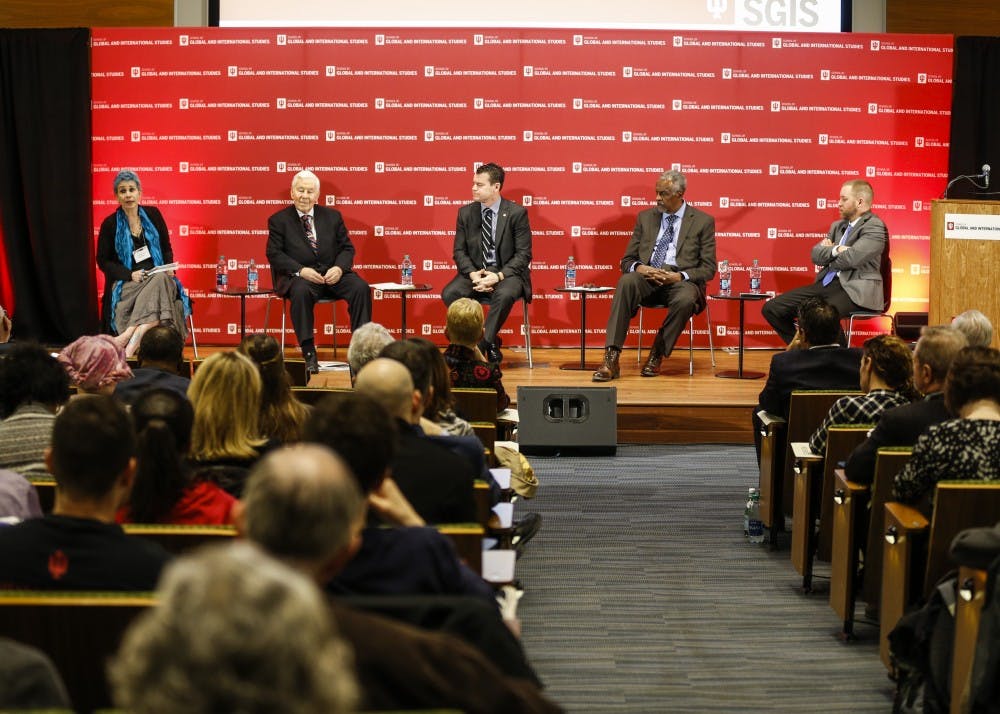A recurring question raised at the third annual America’s Role in the World Conference was one which two retired Congressmen, Sen. Richard Lugar and Rep. Lee Hamilton, said they were frequently asked by presidents in the Oval Office.
What do we do now?
Top international relations thinkers and actors gathered at the IU School of Global and International Studies on Wednesday and Thursday to address the importance of American leadership, international diplomacy and individual actions for United States national security and foreign policy.
Samantha Power, U.S. permanent representative to the United Nations from 2013 to 2017, gave the keynote address.
“When the U.S. doesn’t lead, bad things are likely to happen,” Power said.
Under the theme "Foreign Policy Begins at Home," the conference convened esteemed activists, government officials, academics and journalists to discuss the decline of democracy, global refugee policy, the rise of Asian powers, Russia’s influence and Indiana’s role in global events.
Lugar and Hamilton, the conference’s co-conveners, are both known for working across party lines during their tenures as respective chairs of the Senate Foreign Relations and House Foreign Affairs committees.
In a Wednesday session moderated by IU alumna and Fox News analyst, Marie Harf, Lugar and Hamilton noted the importance of ongoing communication between Congress and the executive branch as partisan tensions increase.
Lee Feinstein, the dean of SGIS and the former U.S. ambassador to Poland, said in an interview, the legislators' bipartisan leadership sets a valuable example of how politicians can work with people of different points of view to produce good decisions.
“For our students, there’s almost no direct experience of that given the recent experience of our country,” Feinstein said. “Where issues of all kinds, including global issues, are so polarized.”
Both Lugar and Hamilton asserted their pride in America’s history of global leadership.
“The better we do at home, the stronger our foreign policy will be,” Hamilton said.
This concept, reflecting the theme of the conference, was underscored by other panelists.
Celeste Wallander, President and CEO of the U.S.-Russia Foundation, said evaluating other countries' national interests can help understand the aims of U.S. adversaries, including Russia. Meanwhile, Wallander said, the U.S. must assess its own national interests before engaging in diplomacy.
Wallander said U.S. and Russian national interests are incompatible.
IU senior Lucy Brown said she was glad the conference included a session on Russia because she, along with many Americans, feels unsettled by Russian involvement in the U.S.
In a time when relations between the U.S. and Russia are as bad as they’ve been since the Cold War, James Collins, former U.S. ambassador to the Russian Federation, said domestic unity is crucial.
Domestic unification was one of three points emphasized in Power’s keynote address.
Her talk, sprinkled with personal anecdotes from her tenure in President Obama's administration, also focused on the role of U.S. leadership in promoting international cooperation, and the use of diplomacy.
"One of the greatest threats to our national security is our domestic division," Power said.
After her speech, about 30 SGIS students joined Power and Matthew Barzun, U.S. ambassador to the United Kingdom from 2013 to 2017, for an informal luncheon.
As a well-known advocate of humanitarian intervention, Power said she was often questioned on the Obama’s administration’s decision to not intervene in Syria.
She said she would come back from meetings on Syrian policy that did not align with her personal morals and gather other officials to brainstorm smaller scale options of effecting change in Syria.
Power said individual citizens should recognize their ability to influence foreign policy through local elections, grassroots cooperation and foreign service.
“There’s always something we can do,” Power said.




